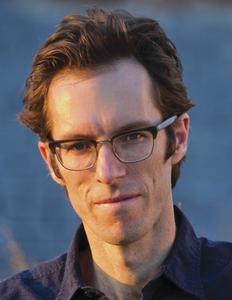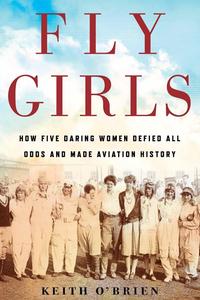 Keith O'Brien is an award-winning journalist and author of Outside Shot, about basketball in rural Kentucky. He has been a finalist for the PEN/ESPN Award for Literary Sportswriting and contributed to National Public Radio for more than a decade. O'Brien has also written for the New York Times, the Washington Post, USA Today, Politico, Slate, Esquire.com and the Oxford American, among others. He lives in New Hampshire with his wife and two children. His new book, Fly Girls: How Five Daring Women Defied All Odds and Made Aviation History (Eamon Dolan/Houghton Mifflin Harcourt, $28), is reviewed below.
Keith O'Brien is an award-winning journalist and author of Outside Shot, about basketball in rural Kentucky. He has been a finalist for the PEN/ESPN Award for Literary Sportswriting and contributed to National Public Radio for more than a decade. O'Brien has also written for the New York Times, the Washington Post, USA Today, Politico, Slate, Esquire.com and the Oxford American, among others. He lives in New Hampshire with his wife and two children. His new book, Fly Girls: How Five Daring Women Defied All Odds and Made Aviation History (Eamon Dolan/Houghton Mifflin Harcourt, $28), is reviewed below.You first learned of these women while you were, ironically, on a plane.
In spring 2016, I was reading Lily Koppel's The Astronaut Wives Club on a flight to Pittsburgh. One of my all-time favorite books is The Right Stuff by Tom Wolfe, and I was interested to learn that story from the wives' perspectives. As I read, I became captivated by a reference to an all-female air race, the Powder Puff Derby. I consider myself well read and educated, yet I had never heard of this. My plane had wi-fi, so I cracked open my laptop and started Googling. I did what all good storytellers do: I stumbled on a little nugget of a story, just a little crumb, and followed it down a path. Sometimes these nuggets don't lead anywhere. Other times, they take you to a magical place you never knew existed.
Did you know immediately that this was a bigger story than one race?
By the time I landed in Pittsburgh, I knew I needed to get to a library soon. After my kids were asleep and my workday was done, I started going to my town's university library at night to research these races and these remarkable unknown women. While I was tracing these women's lives, I was looking for a narrative--what is the story and who are the primary characters in that story? That was a journey with a lot of stops and starts. When I found Florence Klingensmith, everything came together. She was one of the few women who raced against men, and was the first to do so in a race of great importance. She was one of the most talented female pilots of her time and undoubtedly more talented and skilled than Amelia Earhart.
Why do you think Florence Klingensmith, Ruth Elder, Louise Thaden and Ruth Nichols aren't as well known as Amelia Earhart?
I think we remember Amelia for several reasons. You can't underestimate how famous she was at that time. When she flew across the ocean as a passenger in 1928, and when that plane succeeded in reaching the coast of Wales, it made her one of the world's most famous women. Of course, it didn't hurt that she was backed by the full power of the George Putnam publishing machine, cranking out her books and sending her on a lecture tour. To Amelia's credit, she didn't rest on her laurels. She could have taken that flight, gone on the lecture circuit, done a vaudeville show, gone to Hollywood. She was also outspoken. People thought she was famous for doing nothing and criticized her behind her back--she knew that. In response, she spent the rest of her very short life--her remaining nine years--challenging herself and answering her critics.
 Had it not been for happenstance, crashes and others' instances of sheer bad luck, we might be remembering one or all of them instead. Their stories and accomplishments are just as fascinating.
Had it not been for happenstance, crashes and others' instances of sheer bad luck, we might be remembering one or all of them instead. Their stories and accomplishments are just as fascinating.Right. Fly Girls isn't just a story about airplanes flown by women. There was a purpose in what these women were trying to do. To put it in context, when a man attempted to fly across the ocean or race across the country, he was treated as a hero. If he died, he was memorialized with a grand tribute. When a woman tried the exact same thing, to push the limits of what she could do--and what planes at the time could do--her failure was severely criticized. She was judged harshly and treated horribly. Florence's story is an example of that. What happened to her changed the course of aviation history and certainly the course of my narrative. I'll be honest--her story also really changed me.
Have you talked with any of the pilots' surviving family members?
I spoke to many relatives, including Louise's daughter, who was three years old when this story ends. As a reporter, when you sit with someone's child and talk at length with them about their parents, you come to know that person in ways that you would not have otherwise.
You are also giving the families, and the world, the gift of knowing these women and their rightful place in history.
These five women founded and were charter members of an organization called the Ninety-Nines, still in existence today. I recently had the honor of speaking to them, and only a few in the audience had ever heard of these women. Florence is remembered in the small Minnesota community where she lived. But when I called around to Rye, N.Y., and Anniston, Ala., nobody knew Ruth Nichols or Ruth Elder, respectively.
What advice do you think the pilots would give to women--pilots or not--today?
They knew they were connected because of discrimination and how men regarded them. One woman's failure was every woman's failure. The opposite was true, too: one woman's success was to everyone's benefit. They were rivals at times and racing to beat each other, but they knew that they all needed to make it. Amelia talked about the importance for women to "keep knocking" on closed doors. "As more knock, the more will enter," she famously said. That was true in 1936 and sadly, remains true now. --Melissa Firman

